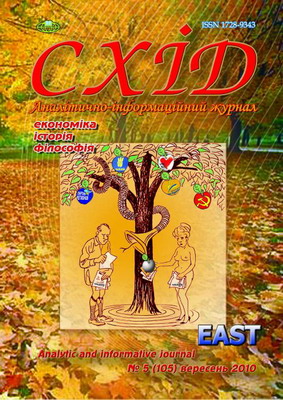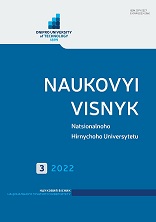
Бази даних
Наукова періодика України - результати пошуку
 |
Для швидкої роботи та реалізації всіх функціональних можливостей пошукової системи використовуйте браузер "Mozilla Firefox" |
|
|
Повнотекстовий пошук
| Знайдено в інших БД: | Реферативна база даних (1) |
Список видань за алфавітом назв: Авторський покажчик Покажчик назв публікацій  |
Пошуковий запит: (<.>A=Lomachinska I$<.>) | |||
|
Загальна кількість знайдених документів : 6 Представлено документи з 1 до 6 |
|||
| 1. | 
Lomachinska I. Value orientations of information culture as a key factor of society information security [Електронний ресурс] / I. Lomachinska // Схід. - 2018. - № 5. - С. 34-38. - Режим доступу: http://nbuv.gov.ua/UJRN/Skhid_2018_5_7 | ||
| 2. | 
Lomachinska I. The ideological sources of religious leadership in Ukrainian cultural space [Електронний ресурс] / I. Lomachinska, S. Khrypko, G. Iatsenko // Схід. - 2019. - № 3. - С. 84-88. - Режим доступу: http://nbuv.gov.ua/UJRN/Skhid_2019_3_15 | ||
| 3. | 
Lomachinska I. Transformation of Ukrainian Name-giving Process: Historical Analysis [Електронний ресурс] / I. Lomachinska, S. Khrypko, G. Iatsenko // Схід. - 2019. - № 4. - С. 68-74. - Режим доступу: http://nbuv.gov.ua/UJRN/Skhid_2019_4_12 | ||
| 4. | 
Lomachinska I. The phenomenon of Missionary Activity of Christian Churches in the Virtual Space [Електронний ресурс] / I. Lomachinska, P. Grebenyuk // Схід. - 2020. - № 5. - С. 54-59. - Режим доступу: http://nbuv.gov.ua/UJRN/Skhid_2020_5_9 | ||
| 5. | 
Horban O. A knowledge management culture in the European higher education system [Електронний ресурс] / O. Horban, L. Babenko, I. Lomachinska, O. Hura, R. Martych // Naukovyi visnyk Natsionalnoho Hirnychoho Universytetu. - 2021. - № 3. - С. 173-177. - Режим доступу: http://nbuv.gov.ua/UJRN/Nvngu_2021_3_29 Purpose. Improving the quality of educational services by identifying the features and current trends in the development of knowledge management culture in the European higher education system. Methodology. The research methodology involves application of the systematic approach methods. 1. Structural approach related to defining the structural features of knowledge management culture in higher education institutions in Europe. 2. Functional approach that determines the essence and target orientation of the knowledge management function. The use of the comparative method allowed the authors to highlight the essential content of the concept "knowledge management culture" in relation to the concepts of "organizational culture" and "information culture". The dialectical method of cognition was also involved, which made it possible to comprehensively consider the phenomenon of knowledge management culture in educational discourse through the contradictory relationships of its various sides and aspects. Findings. The culture of knowledge management in the European higher education system is considered at three main levels: 1. Cognitive level, implying a change in the style of thinking, mobilization of intellectual potential, and creativity. 2. Management level, involving the use of analytics and innovative leadership. 3. Technological level, based on the use of information and communication technology in the accumulation, transfer and management of knowledge. Originality. Knowledge management culture is studied in close relationship with the organizational and information culture. The features of knowledge management at three organizational levels have been determined: cognitive, managerial and technological ones. Practical value. The institutions of the European higher education system use knowledge to gain and maintain competitive advantages. Insufficient attention to the issue of knowledge management leads to a decrease in the ranking of higher education institutions. The introduction of knowledge management culture provides improvement in the psychological microclimate of a team, dominance of the atmosphere of creativity, an increase in the level of self-education, disclosure of personal intellectual potential, formation of a system of innovative leadership, stimulation of scientific research and, as a result, an increase in the quality of educational services. | ||
| 6. | 
Lomachinska I. The religious factors of the Ukrainian mentality formation [Електронний ресурс] / I. Lomachinska, E. Deinega, O. Donets // Схід. - 2021. - Т. 1(3). - С. 34-39. - Режим доступу: http://nbuv.gov.ua/UJRN/Skhid_2021_1(3)__6 | ||
 |
| Відділ наукової організації електронних інформаційних ресурсів |
 Пам`ятка користувача Пам`ятка користувача |